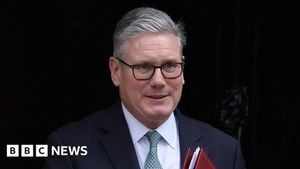Ghislaine Maxwell, the disgraced British socialite convicted for her role in Jeffrey Epstein's sex trafficking ring, is poised to mount a fresh legal challenge against her 20-year prison sentence. On July 16, 2025, her family announced plans to leverage new evidence, including claims of "government misconduct," in hopes of overturning her conviction and securing her release.
Maxwell, 63, was found guilty in December 2021 of luring vulnerable young girls to Epstein’s properties between 1994 and 2004, where the financier sexually abused them. She was sentenced the following year in the Southern District of New York (SDNY) federal court to two decades behind bars. Since then, her family has consistently maintained that she did not receive a fair trial, despite multiple rejected appeals.
Central to Maxwell’s latest legal effort is a writ of habeas corpus, a court order that demands a prisoner be brought before a judge to assess the legality of their detention. Her legal team argues this writ could be filed based on newly uncovered evidence, including alleged government misconduct that, they say, would have likely altered the outcome of her trial.
One significant point of contention revolves around a 2007 non-prosecution agreement between Epstein and the U.S. Department of Justice. Under this deal, Epstein was allowed to serve a mere 13 months in a Florida county jail with work-release privileges, and the government agreed not to prosecute any of his co-conspirators. Maxwell’s lawyers contend that this agreement should have shielded her from prosecution. However, lower courts have dismissed this argument, ruling that the agreement was binding only within the Southern District of Florida and not applicable to prosecutors in New York.
David Oscar Markus, one of Maxwell’s attorneys, sharply criticized the government’s stance. "I'd be surprised if President Trump knew his lawyers were asking the Supreme Court to let the government break a deal," Markus said. "He's the ultimate dealmaker and I'm sure he'd agree that when the United States gives its word, it should keep it. With all the talk about who's being prosecuted and who isn't, it's especially unfair that Ghislaine Maxwell remains in prison based on a promise the US government made and broke." The Maxwell family echoed these sentiments, emphasizing their profound agreement with Markus’s remarks.
As Maxwell’s legal team prepares to file their reply to the government’s opposition in the U.S. Supreme Court, they have also indicated readiness to pursue the habeas corpus writ in the Southern District of New York if necessary. This multi-pronged legal strategy underscores their determination to challenge Maxwell’s imprisonment.
While Maxwell fights her case behind bars, she has been observed maintaining a fitness routine at the low-security Federal Correctional Institution in Tallahassee, Florida, where she is currently serving her sentence. Reports from July 10, 2025, show her walking and jogging around the prison track in the evenings, a picture of resilience amid her ongoing legal battles.
The broader context surrounding Maxwell’s case remains fraught with controversy and public interest. Epstein, who was awaiting trial on sex trafficking charges, was found dead in his Manhattan jail cell in August 2019. His death was officially ruled a suicide, but skepticism and conspiracy theories have persisted, fueled by irregularities such as missing surveillance footage from the night of his death.
In early July 2025, the FBI and Department of Justice released a joint memo concluding a systematic review of Epstein’s case files. The review found "no credible evidence" that Epstein was murdered, had blackmailed prominent individuals, or maintained a "client list" that implicated others in his crimes. This announcement sparked outrage among various political factions, particularly supporters of former President Donald Trump, who have called for the full release of all related documents.
Attorney General Pam Bondi, who has been at the center of the controversy, initially suggested in February 2025 that Epstein’s so-called "client list" was on her desk awaiting review. However, she later clarified that she was referring more broadly to the Epstein case files. This back-and-forth has added to the confusion and mistrust surrounding the case.
Political figures have weighed in as well. U.S. House Speaker Mike Johnson expressed support for transparency, stating, "It's a very delicate subject, but we should put everything out there and let the people decide it." Other Republican lawmakers have echoed calls for appointing a special counsel to investigate Epstein’s crimes further if more files are not released.
Meanwhile, within Trump’s own political base, there is division over the handling of the Epstein files. Some allies demand full disclosure, while Trump himself has dismissed many conspiracy theories as "bulls**t" and described the documents as "pretty boring." Nonetheless, he has urged the Department of Justice to release all "credible" information from its investigation.
The Maxwell case also intersects with broader scandals involving high-profile figures. Documents unsealed in 2024 from a civil lawsuit brought by one of Epstein’s victims, Virginia Giuffre, linked dozens of prominent individuals across entertainment, business, politics, and academia to Epstein. While these individuals were not necessarily implicated in criminal activity, the revelations intensified public scrutiny. Giuffre tragically died by suicide earlier this year in Australia, adding a somber note to the ongoing saga.
Throughout her 2021 trial, prosecutors painted Maxwell as a "dangerous" figure who played a pivotal role in facilitating Epstein’s abuse of underage girls. They detailed how she enticed vulnerable teenagers to Epstein’s properties, enabling years of exploitation. Despite this, Maxwell’s supporters argue that she has been unfairly singled out and that much of the evidence against her is questionable.
Adding another layer to the drama, reports have surfaced that Maxwell’s legal team is exploring the possibility of seeking a pardon from former President Trump. They believe that the recent closure of the Epstein inquiry in the U.S. presents a "window of momentum" for such a move, highlighting the complex interplay between legal strategy and political considerations.
As the legal and political battles continue, Maxwell’s fate remains uncertain. Should the Supreme Court decline to hear her appeal and the habeas corpus writ fail, she is expected to remain incarcerated until her scheduled release in July 2037. Until then, the Maxwell-Epstein saga will likely continue to captivate public attention, raising difficult questions about justice, accountability, and the shadows cast by powerful individuals.






